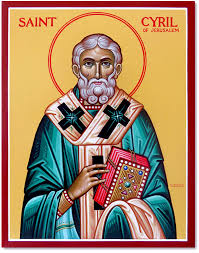HOMILY LENT WEEK 03 06 – Year I
Responding to a Relational God:
Optional Memorial of St. Cyril of Jerusalem
(Hos 5:15-6:6; Ps 51; Lk 18:9-14)
****************************************
Have you ever tried to earn anyone’s love?
The readings today invite us to respond to a relational God through humble honesty, trusting repentance and grateful service.
The tendency to try to earn someone’s love is a rather human one, and I suspect affects many of us. John, who grew up with an alcoholic father, found himself trying to earn his father’s love by being obedient, dutiful, and especially working hard and doing tasks perfectly.
There are four main survival roles in any dysfunctional family – family hero, scapegoat, withdrawn child, and comedian. The last was John’s role until grade 12, when he decided it wasn’t working so he would become the family hero by studying hard. When getting the top grade did not get his father’s attention, he rebelled, started partying and drinking, dropped ten percent on his average and as a result, lost out on a scholarship.
John’s experience can help us understand how God must have so often felt towards God’s chosen people, the Israelites. In the first reading, the prophet Hosea points out God always wanted steadfast love and knowledge of God, or an intimate relationship with God, and not the sacrifice and burnt offerings they were giving to God as, I think, a way of subtly trying to earn God’s love instead of trusting in God’s freely given mercy and compassion. How hard it is for us to believe in grace freely given – somehow, we feel compelled to deserve it!
The psalm offers us very much the same message. What God wants is steadfast love and not sacrifice. A broken spirit and a contrite heart are what pleases God, it seems, and not our worthiness or merit, but we resist that as well.
I believe much the same is happening in the gospel with the Pharisee and the tax collector. I am pretty sure the Pharisee, like John, was trying to earn God’s love, pointing out in his prayer all the dutiful and meritorious things he was doing, all the while blindly ignorant of how he was also judging another member of the church praying beside him. Both were doing a holy thing – praying in the temple, but with totally different attitudes.
The tax collector knew he was a sinner, admitted it freely, humbly looked down and pleaded for God to have mercy on him. He repented, trusted in God’s mercy, compassion, unconditional love and forgiveness, and went home justified, changed, transformed. As Richard Rohr likes to write, he got it right by doing it wrong. The Pharisee, on the other hand, got it wrong by doing it right – by self-righteously depending on his own efforts to earn God’s love.
More and more, we are coming to understand God as a relational God, a dynamic interactive exchange of love between three persons, Father, Son and Holy Spirit, a perichoresis, or divine dance of love. From the beginning, God has always wanted an intimate covenant relationship with God’s people, so it should not surprise us when God informs us over and over in the scriptures that love trumps sacrifice, and relationship trumps dutiful actions. God wants to go hunting and fishing with us, not grimly working in the fields trying to get our attention!
Jesus as the Messiah came with a two-fold relational mission– to redeem and to sanctify, to forgive and to heal, or as it is reflected in the psalm, to “wash” and to “cleanse.” Our best way to enter into the divine dance with God, to respond to his love, is not to try to earn it, but rather to repent, trust, and come to God for forgiveness of all our sins, and for healing of all our painful emotions and negative attitudes, like the judgmentalism of the Pharisee.
 Today we honour St. Cyril, who was born in Jerusalem about 315. He became a biblical scholar and a cleric in the church of Jerusalem, a church troubled by many doctrinal controversies, including Arianism. Ordained about 342, he became bishop of Jerusalem in 350. His famous Lenten instructions, Catecheses, outline his beliefs and the theological traditions of the Jerusalem community. He died in Jerusalem in 387.
Today we honour St. Cyril, who was born in Jerusalem about 315. He became a biblical scholar and a cleric in the church of Jerusalem, a church troubled by many doctrinal controversies, including Arianism. Ordained about 342, he became bishop of Jerusalem in 350. His famous Lenten instructions, Catecheses, outline his beliefs and the theological traditions of the Jerusalem community. He died in Jerusalem in 387.
The Eucharist means “thanksgiving,” a very fitting meaning, as the bottom line is that we can’t earn God’s love, and so the best attitude with which to approach God in worship is gratitude, praise and thanksgiving.
May our celebration today deepen our faith and trust in our God who is unconditional love, and empower us to both soak up that love with gratitude, and share that love through selfless service.



